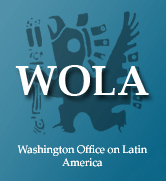Central America- Dominican Republic Free Trade Agreement (CAFTA)
Central America - Dominican Republic Free Trade Agreement CAFTA Washington Office on Latin America (WOLA) - In their own words - About CAFTA The purported aim of DR-CAFTA (Dominican Republic-Central American Free Trade Agreement) is to liberalize U.S. and Central America markets, creating a free-trade zone similar to that created between the US, Mexico and Canada as a result of the North American Free Trade Agreement (NAFTA). DR-CAFTA provisions eliminate tariffs on basic grains, such as rice, beans and corns both immediately and gradually depending on country and product specific agreements. As such, the agreement particularly affects the rural sector throughout Latin America where small farmers are unable to compete with subsidized agricultural imports from the U.S. This has very troubling implications for poverty and development in a region that is predominantly rural and agriculture based. Fast Track NegotiationsThe Bush Administration aggressively pursued the DR-CAFTA negotiations on a very short timeline; whereas NAFTA took more than seven years to negotiate and the FTAA has been negotiated for almost a decade, DR-CAFTA was completed in one calendar year, with limited civil society or Congressional participation. Negotiations for CAFTA began in January 2003, shortly after the U.S. Congress approved a bill to confer Trade Promotion Authority (or “Fast Track”) to the White House. Under “Fast Track,” Congress is limited to an up or down vote and cannot amend a trade agreement. The agreement was signed on May 28, 2004 in Washington D.C. All signatory nations have approved the agreeement except for Costa Rica, where civil society oppoition continues to be very strong, and this far, has delayed the agreement's implementation.
August 2007 - WOLA News Release Democrats Offer New Ideas on Cuba Policy; WOLA Urges Wider Debate |
Free Trade Areas of Americas (FTAA) - no summit meetings since 2005 . . . politically replaced by WOLA?
